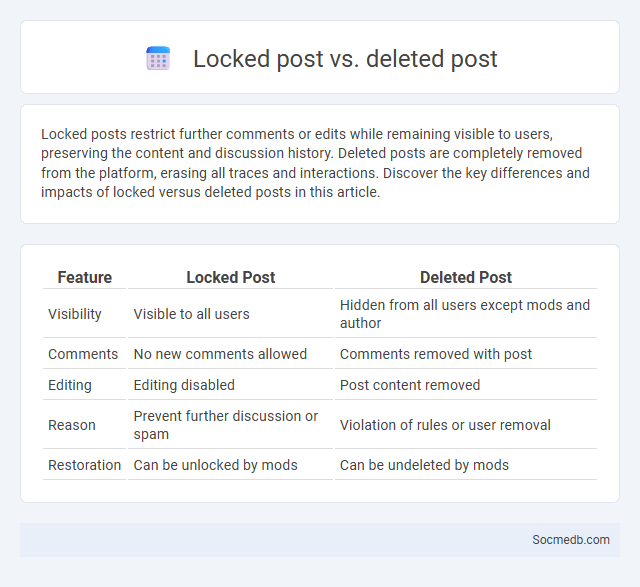
Photo illustration: Locked post vs Deleted post
Locked posts restrict further comments or edits while remaining visible to users, preserving the content and discussion history. Deleted posts are completely removed from the platform, erasing all traces and interactions. Discover the key differences and impacts of locked versus deleted posts in this article.
Table of Comparison
| Feature | Locked Post | Deleted Post |
|---|---|---|
| Visibility | Visible to all users | Hidden from all users except mods and author |
| Comments | No new comments allowed | Comments removed with post |
| Editing | Editing disabled | Post content removed |
| Reason | Prevent further discussion or spam | Violation of rules or user removal |
| Restoration | Can be unlocked by mods | Can be undeleted by mods |
Understanding Locked Posts: Definition and Purpose
Locked posts on social media restrict interactions by limiting comments and shares, enhancing content control and privacy. Platforms implement this feature to prevent spam, reduce harassment, and maintain a focused discussion environment. Understanding locked posts helps you manage your online presence and protect your content from unwanted engagement.
What is a Deleted Post? Key Features Explained
A deleted post is content removed from a social media platform by the user or the platform itself, no longer visible to the public or followers. Key features include the inability to engage through likes, comments, or shares once deleted, and the potential for recovery depending on the platform's policies or whether you have saved a backup. Understanding these aspects helps you manage your digital footprint and maintain control over your online presence.
The Concept of a Locked Thread: An Overview
A locked thread on social media prevents users from adding new comments or replies, effectively freezing the conversation to maintain order and reduce spam or heated disputes. This feature is commonly used by moderators on platforms such as Reddit, Facebook, and forums to enforce community guidelines and ensure discussions remain constructive. Locking threads can also preserve important information while preventing further debate that might derail the original topic.
Differences Between Locked Posts and Deleted Posts
Locked posts restrict further comments or interactions while remaining visible to Your audience, preserving the original content and engagement. Deleted posts are completely removed from the platform, erasing all associated content, comments, and interactions permanently. Understanding these differences helps manage your social media presence effectively by choosing whether to limit engagement or remove content entirely.
Locked Thread vs Locked Post: What Sets Them Apart?
A locked thread restricts all replies and further contributions within that entire conversation, effectively freezing the discussion in place. In contrast, a locked post only prevents new comments on that specific entry while allowing continued interaction elsewhere in the thread. Understanding this distinction helps you manage engagement and maintain control over your social media content effectively.
Situations That Lead to Posts or Threads Being Locked
Posts or threads on social media platforms are often locked due to violations of community guidelines, including hate speech, harassment, or sharing false information. Automated moderation tools and user reports frequently trigger these restrictions to maintain safe and respectful online environments. Content promoting violence, spam, or misinformation also constitutes common reasons for locking discussions.
Reasons for Post Deletion on Online Platforms
Post deletion on online platforms often occurs due to violations of community guidelines, including hate speech, misinformation, or explicit content. Users may also choose to remove posts to protect their privacy, manage their digital footprint, or correct previously shared incorrect information. Understanding these reasons helps you maintain a positive and compliant online presence.
Community Guidelines: When Do Posts Get Locked or Deleted?
Social media platforms enforce Community Guidelines to maintain safe and respectful environments by locking or deleting posts that contain hate speech, misinformation, violent content, or violate privacy policies. Automated algorithms combined with human moderators review flagged content for compliance, ensuring posts that spread harmful or illegal material are promptly removed. Users can appeal content decisions, but repeated violations often lead to account suspensions or permanent bans to preserve platform integrity.
Impact on Users: Locked Posts, Deleted Posts, and Locked Threads
Locked posts restrict user interaction by preventing new comments and edits, which can reduce the spread of misinformation but also limit community engagement. Deleted posts remove content entirely, impacting user experience by erasing discussions or valuable information, sometimes causing frustration or confusion. Locked threads freeze ongoing conversations, maintaining the existing content while stopping further dialogue, often used to control heated debates or prevent spam.
Moderation Best Practices: Handling Locked and Deleted Content
Effective social media moderation requires clear protocols for handling locked and deleted content to maintain community standards while respecting user rights. Implementing automated systems combined with human review helps identify harmful content accurately, ensuring timely removal or restriction without compromising free expression. Regular audits and transparent communication about moderation policies foster trust and minimize disputes related to content moderation decisions.
 socmedb.com
socmedb.com